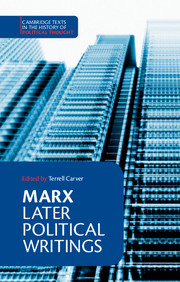Book contents
- Frontmatter
- Contents
- Acknowledgements
- Editor's introduction
- Chronology of Marx's Life and Career, 1848–1883
- Bibliography
- Editor's note on texts and translations
- Glossary of major historical figures
- Manifesto of the Communist Party (with Friedrich Engels)
- The Eighteenth Brumaire of Louis Bonaparte
- ‘Introduction’ to the Grundrisse
- ‘Preface’ to A Contribution to the Critique of Political Economy
- The Civil War in France
- Critique of the Gotha Programme
- ‘Notes’ on Adolph Wagner
- Index
- Cambridge Texts in the History of Political Thought
Editor's note on texts and translations
Published online by Cambridge University Press: 05 June 2012
- Frontmatter
- Contents
- Acknowledgements
- Editor's introduction
- Chronology of Marx's Life and Career, 1848–1883
- Bibliography
- Editor's note on texts and translations
- Glossary of major historical figures
- Manifesto of the Communist Party (with Friedrich Engels)
- The Eighteenth Brumaire of Louis Bonaparte
- ‘Introduction’ to the Grundrisse
- ‘Preface’ to A Contribution to the Critique of Political Economy
- The Civil War in France
- Critique of the Gotha Programme
- ‘Notes’ on Adolph Wagner
- Index
- Cambridge Texts in the History of Political Thought
Summary
All translations in this volume are new and are based on first editions or reliable copy-texts of manuscripts unpublished in Marx's lifetime. Successive editors have hardly altered the ‘classical’ English translations, produced between the 1880s and the 1930s, of the Manifesto of the Communist Party, The Eighteenth Brumaire of Louis Bonaparte, the ‘Preface’ to A Contribution to the Critique of Political Economy, and the Critique of the Gotha Programme. The Civil War in France was written in English, and so does not pose a problem. The manuscript materials – the ‘Introduction’ of 1857 to the Grundrisse and the ‘“Notes” on Adolph Wagner’ – appear in my own translations of 1975. I am grateful to Basil Blackwell Ltd for permission to reproduce this material from my Texts on Method.
It is my aim as editor of the present volume to depart substantially from the way that Marx has previously been presented in English, and in other languages, including German (which was not always the original language of his work). Marx was made responsible for a doctrine or doctrines by Engels and by subsequent Marxists, and by editors who took the view that he should be presented doctrinally in terms of what his thought became, according to a posthumous scheme, rather than what it arguably was, when his writings were generated in the political context that prevailed at the time of first publication or authorial production.
- Type
- Chapter
- Information
- Marx: Later Political Writings , pp. xxvi - xxviiPublisher: Cambridge University PressPrint publication year: 1996
- 1
- Cited by



